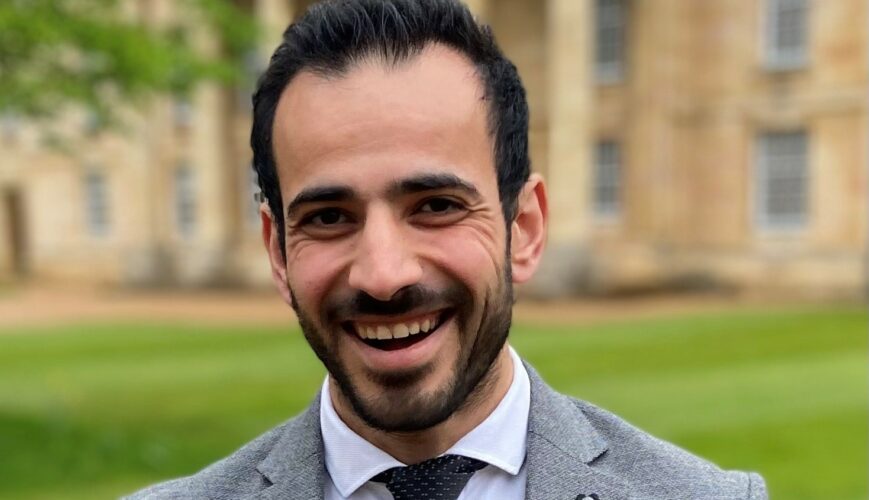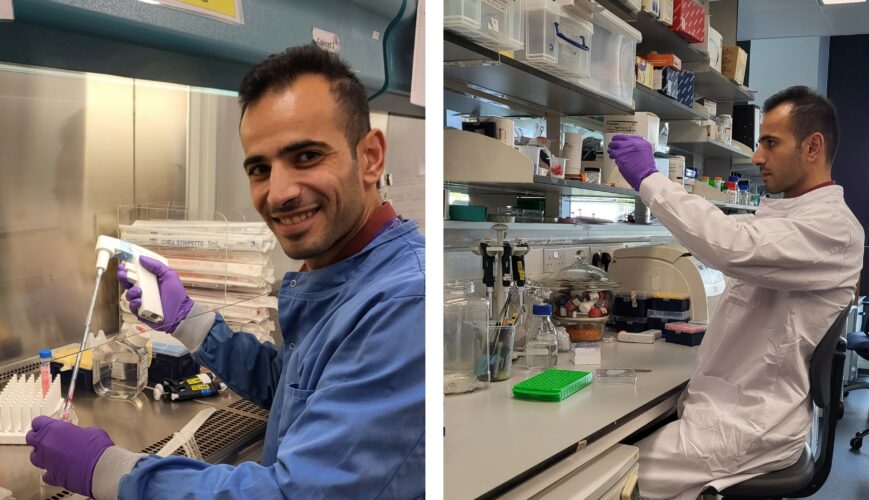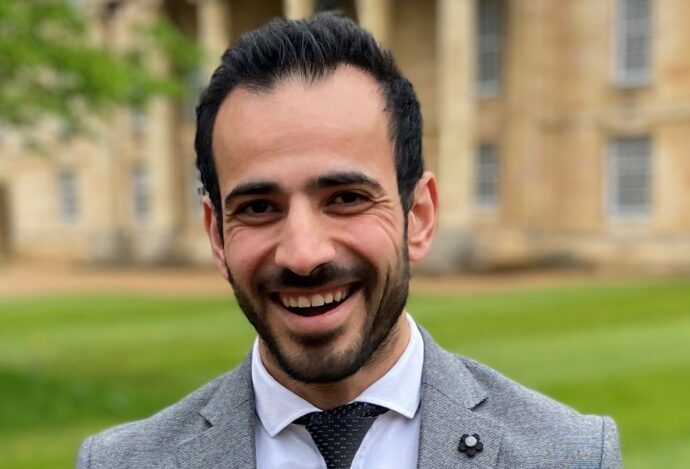Dr Islam Alshamleh is a Research By-Fellow at Hughes Hall and a Postdoctoral Fellow at the Cancer Research UK (CRUK) Cambridge Institute.
Islam is a cancer cell biologist with a research interest in cancer metabolism. He studies how cancer cells fulfil their energy and bio-synthetic needs. The ultimate goal of his work is to exploit these cancer-specific phenotypes to develop new biomarkers for diagnosing as well as for treating brain tumours.
Education and background
Exactly 12 years ago, Islam started his studies in medical laboratory sciences back in his home country, Palestine. Islam trained on hospital laboratories diagnostics and worked extensively with cancer patients. He has always longed for a research career that can impact patients and improve their treatment options. To pursue his dream career, Islam moved to the UK where he started his postgraduate studies.

Dr Islam Alshamleh is a Research By-Fellow at Hughes Hall and a postdoctoral Fellow at the Cancer Research UK (CRUK) Cambridge Institute.
“During my clinical training in hospital, I performed countless diagnostic tests for our cancer patients. I couldn’t help but feel their daily suffering and frustration. I knew instantly that I wanted to do more, to be out the in the research field and to develop new therapies that make a difference. It did not take long before I left hospital and moved to the UK to do my Master’s.”
Islam did his Master’s degree on stem cell biology and later his PhD on Leukaemia metabolism.
Current research
“Cancer cells grow with abnormally fast rates which increases their demand for energy substrates and building blocks. In my PhD, I worked on a subset of acute Leukaemia which showed an abnormal pattern of cellular metabolism, specifically mitochondrial metabolism. I worked for a few years in Frankfurt University Hospital on understanding the molecular driver for this pattern where I identified the gene called “PDP1” responsible for this phenotype.”
“Currently, colleagues in the chemistry department back in Frankfurt are working on developing a drug that targets this protein, which can hopefully have a clinical utilisation in the future.”

“At CRUK, we are developing magnetic resonance imaging (MRI) methods that use these metabolic indicators and biomarkers to predict whether a tumour is likely responding to treatment or whether a different therapeutic option must be considered.”
On the way to Cambridge
After his PhD, Islam moved to Cambridge in 2022 to join Prof. Kevin Brindle’s laboratory in Cancer Research UK Cambridge Institute. His current work still revolves around cancer metabolism, but this time, brain tumours. He works closely with clinicians and neurosurgeons in Addenbrooke’s Hospital in order to study tumours (removed from patients) in the laboratory. He then uses a variety of molecular biology tools and animal models to recapitulate the tumours’ phenotypes and assess their response to therapy.
“One of the main challenges we face in therapy development for cancer patients is the evolution of drug resistance. For a variety of known and unknown reasons, some patients do not respond to a specific drug and some of the responders stop responding over time. My current research focus is to understand the metabolic determinants that drive drug resistance in brain tumours. We try to overcome these resistance mechanisms by repurposing therapies that directly target them.”
“At CRUK, we are developing magnetic resonance imaging (MRI) methods that use these metabolic indicators and biomarkers to predict whether a tumour is likely responding to treatment or whether a different therapeutic option must be considered. We hope that these new diagnostic modalities will have a significant impact on patients’ outcomes.”
What’s next?
Islam anticipates this work to have a real impact on patients’ lives in future. By the time he leaves Cambridge, he will have had established a clear research path as well as a clear perspective on what his future laboratory focus will be.
“I think my current journey in Cambridge, with all of the experience I am gathering along the way as well as the network I am building will be the key to success when I start my laboratory. I aspire for my future group to be a leading laboratory in innovating new diagnostic modalities and identifying new therapeutic targets in cancer.”
Why Hughes Hall?
“Being in Cambridge has been a wonderful experience, especially the Hughes Hall part. The College environment is friendly, hierarchy is flat, and people are very easy to talk to. You might get to know people over lunch, or even just have a random chat during events to realise they are stellar scientists or successful entrepreneurs. I got the opportunity to work with and supervise some of the brightest students in the world. Basically, the level of novelty and success you encounter here is truly inspiring.”
“Being in Hughes Hall keeps reminding me that there is much more beyond my own research field. There are business seminars, climate discussions, political conversations, etc.… All of this is happening at Hughes. It is such an enriching environment.”
Find out more
To follow Islam’s research, check out his Google Scholar profile (https://scholar.google.com/citations?user=WzEAC0QAAAAJ&hl=en) LinkedIn (https://www.linkedin.com/in/islam-alshamleh-1a0844204/) or email (Islam.alshamleh@cruk.cam.ac.uk).
Islam holds a dual PhD degree from Frankfurt and Birmingham Universities. He has been awarded several fellowships, including a Marie Curie PhD fellowship (2016), a German Research Foundation Walter Benjamin postdoctoral fellowship (2022) and iNext Drug Discovery funding (2023), and he has been endorsed by the Royal Society of Science as an “Exceptional Talent Promise” in 2022.
For our growing compilation of spotlights, see: www.hughes.cam.ac.uk/academic/postdoc-spotlight.
14.9.23





